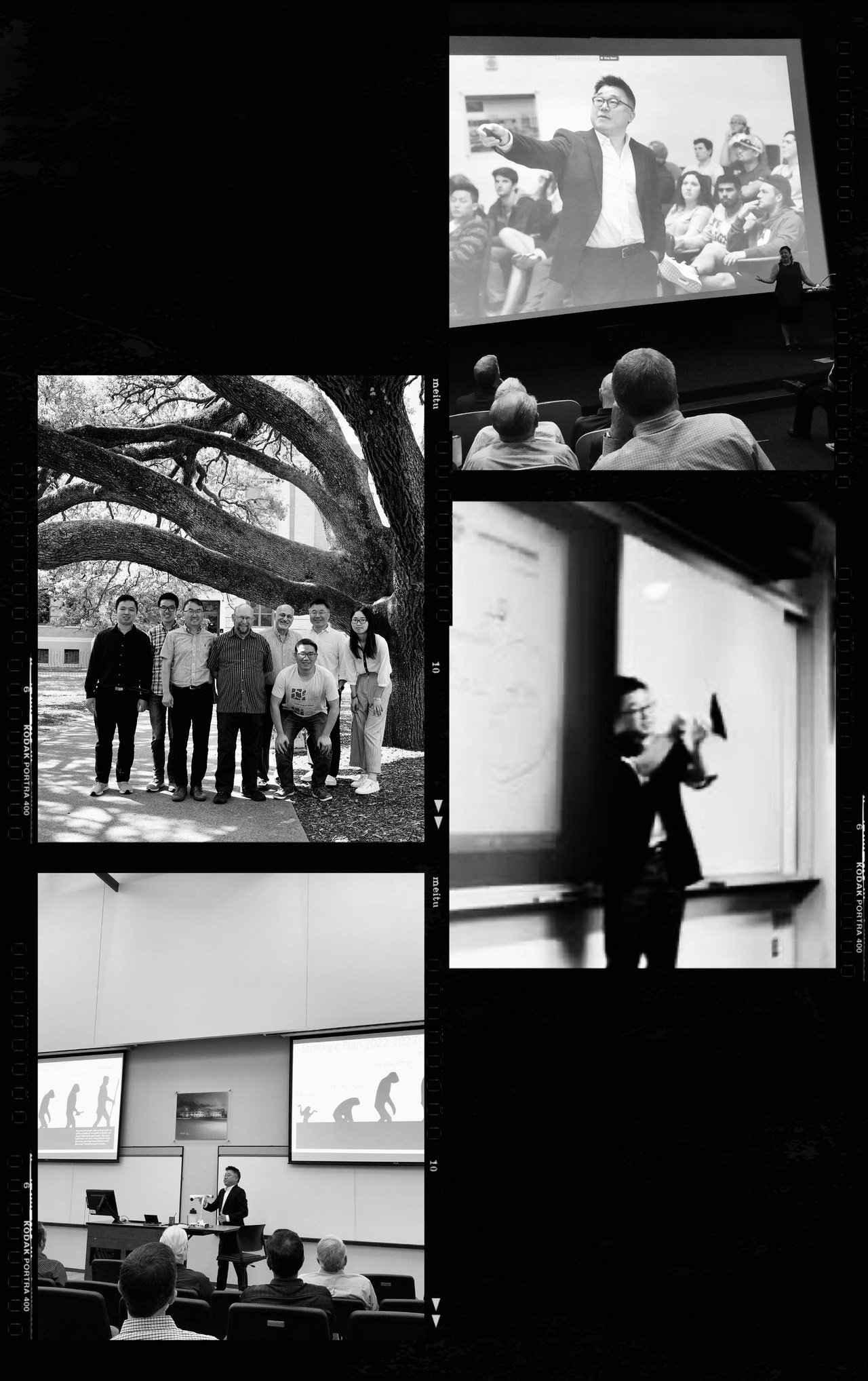Project
The era of new mixed mobility
A paradigm shift in intelligent transportation has occurred, transitioning from a reactive to a predictive approach, thanks to AI’s adaptive power. This shift has led to the proliferation of innovative ideas and their accessibility to the public for real-time decision-making. In the era of mixed modes of transportation, there is an urgent need to rectify and enhance the planning results by adding digital intelligence to the legacy transportation infrastructure planning and management practices. (KC Choi)
ACtive Research Projects
Empowering STEM education by creating benchmarking models for genai learning assistants
Co-Principal Investigator
GenAI offers exciting opportunities to reshape Architecture, Engineering, and Construction (AEC) education. This project will create GenAI-powered learning assistants for undergraduate courses, assess their impact on students’ self-regulated learning, and establish benchmark models tailored to AEC curricula. Led by Texas A&M University, the effort unites expertise in engineering, computer vision, and AI to advance innovative, interdisciplinary approaches in STEM education.
IRES: US-Korea Mutual Advanced Studies Institutes and Beyond
Principal Investigator
The research team proposes a three-year US-Korea workforce development initiative. Building on the success of a prior IRES program, which inspired a parallel Reverse IRES initiative in Korea, the project advances research integrating large language models into adaptive mobility solutions. It aims to cultivate a diverse, globally engaged workforce and encourage the exchange of innovative ideas through intensive and collaborative research experiences.
Constructon impacts during highway Rehabilitation
Co-Principal Investigator
The Texas A&M Transportation Institute leads a NCHRP project with . With decades of experience across diverse settings, the team will deliver a guide, presentation, and technical memo to help DOTs mitigate construction impacts through inclusive, research-driven, and stakeholder-informed practices.
Develop Methodologies for Reducing Costs in Full Depth Reclamation (FDR) Construction
Co-Principal Investigator
TxDOT uses full-depth reclamation (FDR) for pavement rehabilitation, often adding cement for early strength to support daily traffic. However, some materials meet strength requirements without cement, and not all projects need immediate access. With possible cement shortages, asphalt-only FDR designs may lower costs, reduce delays, and boost productivity. Research is needed to evaluate the strength and stiffness of FDR materials with and without cement, considering early traffic access, construction staging, and long-term performance impacts.
Funding Agency
National Science Foundation
Project Funds
$450,000
Project Duration
09/01/2025–08/31/2028
Funding Agency
National Cooperative Highway Research Program
Project Funds
Recommended for funding
Project Duration
09/01/2025–07/30/2027
Funding Agency
Texas Department of Transportation (TxDOT)
Project Funds
$679,486
Project Duration
08/01/2022–07/30/2026
Develop an Interactive State-Wide Production Rate Estimation Tool for Reliable Contract Time Determination
Co-Principal Investigator
This research aims to utilize TxDOT's historical data to create an interactive tool that generates color-coded heat maps, visualizing production rate ranges across Texas for major work items. This advanced tool will greatly assist TxDOT in achieving on-time project completion, improving accuracy in contract time determination, and enhancing contractor schedule evaluations and progress monitoring.
Funding Agency
Texas Department of Transportation (TxDOT)
Project Funds
$374,458
Project Duration
09/01/2023–02/28/2026
REU Site: Smart and Sustainable Construction
Senior Personnel
Undergraduate students, including underrepresented minorities and veterans, from resource-limited programs will engage in a 10-week summer research and training program. Faculty mentors will select research projects and provide preparatory workshops to ensure completion. Enrichment and professional development activities will complement the program, fostering confidence in research skills. An external evaluator will assess the program, and faculty mentors will maintain post-graduation contact for continuous improvement.
Funding Agency
National Science Foundation (NSF)
Project Funds
$400,000 ($227,419 TAMU Share)
Project Duration
07/01/2025-06/30/2028
Funding Agency
National Science Foundation
Project Funds
$402,904
Project Duration
09/01/2023–08/31/2026
Pavement-Maintenance-GPT: Optimizing pavement maintenance decisions using generative AI
Principal Investigator
We are developing Pavement-Maintenance-GPT, an AI tool that transforms pavement repair prioritization. Using Ground Penetrating Radar video and expert input, it simulates human decision-making to optimize maintenance decision making. The project aims to reduce lane closures, emissions, and construction risks, while improving safety, roadway performance, and advancing smarter, more sustainable mobility.
Funding Agency
Center for Health and Efficient Mobility (CHEM)
Project Funds
$75,000
Project Duration
05/01/2025-10/31/2026
develop best practices for temporary pavement design and construction
Co-Principal Investigator
This research aims to develop best practices for the design and construction of temporary detours and traffic-handling sections. Detours often fail prematurely, leading to costly, unplanned repairs in constrained work zones. Since many detours become part of permanent roads, their deterioration must be taken into account during the construction process. The project provides guidance to help engineers, designers, and inspectors improve detour performance and project outcomes.
Funding Agency
Texas Department of Transportation (TxDOT)
Project Funds
$663,869
Project Duration
09/01/2025-08/31/2028
Completed Projects
IRES Track II: US-Korea Advanced Transportation Infrastructure Informatics Institute
Principal Investigator, National Science Foundation (NSF)
$224,614, 07/01/2022-06/30/2024AI-Based Roadway Digital Twinning System for Flooding (AIR-FLOOD)
Principal Investigator, National Oceanic and Atmospheric Administration (NOAA) through the National Sea Grant College Program (Texas)
$300,000, 02/01/2022-08/30/2024Contingency Factors to Account for Risk in Early Construction Cost Estimates for Transportation Infrastructure Projects (NCHRP 15-71)
Co-PI, National Cooperative Highway Research Program (NCHRP), Transportation Research Board of the National Academies
$250,000, 07/01/2020 – 06/30/2022Deep Reinforcement Learning-Based Project Prioritization
Co-PI, U.S. Department of Transportation through the Transportation Consortium of South-Central States
$90,000, 08/01/2020 – 02/01/2022Texas DOT Time Impact Analysis Curriculum Development
Co-PI, Texas Department of Transportation (TxDOT)
$160,000, 01/10/2020 – 08/31/2022Selecting the Most Feasible Construction Phasing Plans for Urban Highway Rehabilitation Projects
Principal Investigator, U.S. Department of Transportation through the Transportation Consortium of South-Central States
$90,000, 08/15/2019 – 02/14/2021Holistic Network-Level Assessment of Pavement Flood Damages
Co-PI, U.S. Department of Transportation through the Transportation Consortium of South-Central States
$75,000, 08/15/2019 – 02/14/2021Perform Feasibility Study on Use of Innovative Tools and Techniques to Accelerate Pavement Construction
Co-PI, Texas Department of Transportation (TxDOT)
$480,843, 09/01/2018 – 08/30/2021Develop Capacity and Cost Benefits of Super 2 Corridors
Co-PI, Texas Department of Transportation (TxDOT)
$299,846, 09/01/2018 – 08/30/2020Systematic Approach for Estimating Construction Contract Time: A Guidebook (NCHRP 08-114)
Co-PI, National Cooperative Highway Research Program (NCHRP), Transportation Research Board of the National Academies
$500,000, 09/01/2018 – 08/30/2020Harnessing Artificial Intelligence towards Autonomous Mobility and Safety Impact Prediction of Critical Highway Projects
Principal Investigator, T3 of Texas A&M Triads for Transformation, TAMU President’s Excellence seed grant program
$30,000, Jan. 2020 – Jan. 2021 (internal grant)Right-Sizing Transportation Investments-Methods for Planning and Programming (NCHRP 19-14)
Co-PI, National Cooperative Highway Research Program (NCHRP), Transportation Research Board of the National Academies
$500,000, Jan. 2017 – Dec. 2019Design-Build Assessment
Co-PI, Maricopa Association of Government (MAG): Task Order No. 15
$97,502, 06/01/2019 – 03/21/2020.Autonomous SWAT Machine-Learning Computer Model for Construction Work Zones
Principal Investigator, Construction Industry Advisory Council
$12,500, 06/01/2016 – 05/30/2017 (Internal grant)Scoping and Managing Critical Transportation Infrastructure Projects
Principal Investigator, University’s Action 2015: Education First Initiative of TAMU
$15,000, 06/01/2014 – 05/31/2015 (Teaching innovation grant)Decision-Support Framework for Quantifying the Most Economical Incentive/Disincentive Dollar Amounts for Critical Highway Pavement Rehabilitation Projects
Principal Investigator, U.S. Department of Transportation UTC Program: SWUTC
$56,625, 03/01/2012 – 08/31/2013Guides on the Use of Social Media to Improve Participation in Public Involvement Processes
Co-PI, Texas Department of Transportation (TxDOT)
$184,496, 08/29/2012 – 08/31/2013Effective Project Scoping Practices to Improve On-Time and On-Budget Delivery of 16 Highway Projects (NCHRP 08-88)
Co-PI, National Cooperative Highway Research Program (NCHRP)
$250,000, Aug. 2012 – Aug. 2015Determining the Effectiveness of the Design-Build Method on Water Infrastructure Rehabilitation Projects
Principal Investigator, District of Columbia Water Resource Research Institute
$53,000Authentication in Mobile−Cloud Environments
Co-PI, UDC strategic initiative fund
$35,000, 05/2010 – 05/2011Incentive-Based Decision-Support Model for Transportation Infrastructure Renewal
Principal Investigator, UDC seed grant award
$7,500 plus a $17,500 in-kind match, 12/2009 – 05/2010Innovative Contracting Methods Implementation Studies
Lead Graduate Research Engineer, California Department of Transportation (Caltrans)
$225,000, 01/2008 – 06/2009Extended Applications of Rehabilitation Construction Productivity Analysis Products (CA4PRS)
Lead Graduate Research Engineer, Federal Highway Administration
$1,200,000, 06/2008 – 06/2010Construction and Traffic Monitoring for I-15 Devore Reconstruction Project
Graduate Research Engineer, California Department of Transportation (Caltrans)
$240,000, 06/2003 – 08/2004



